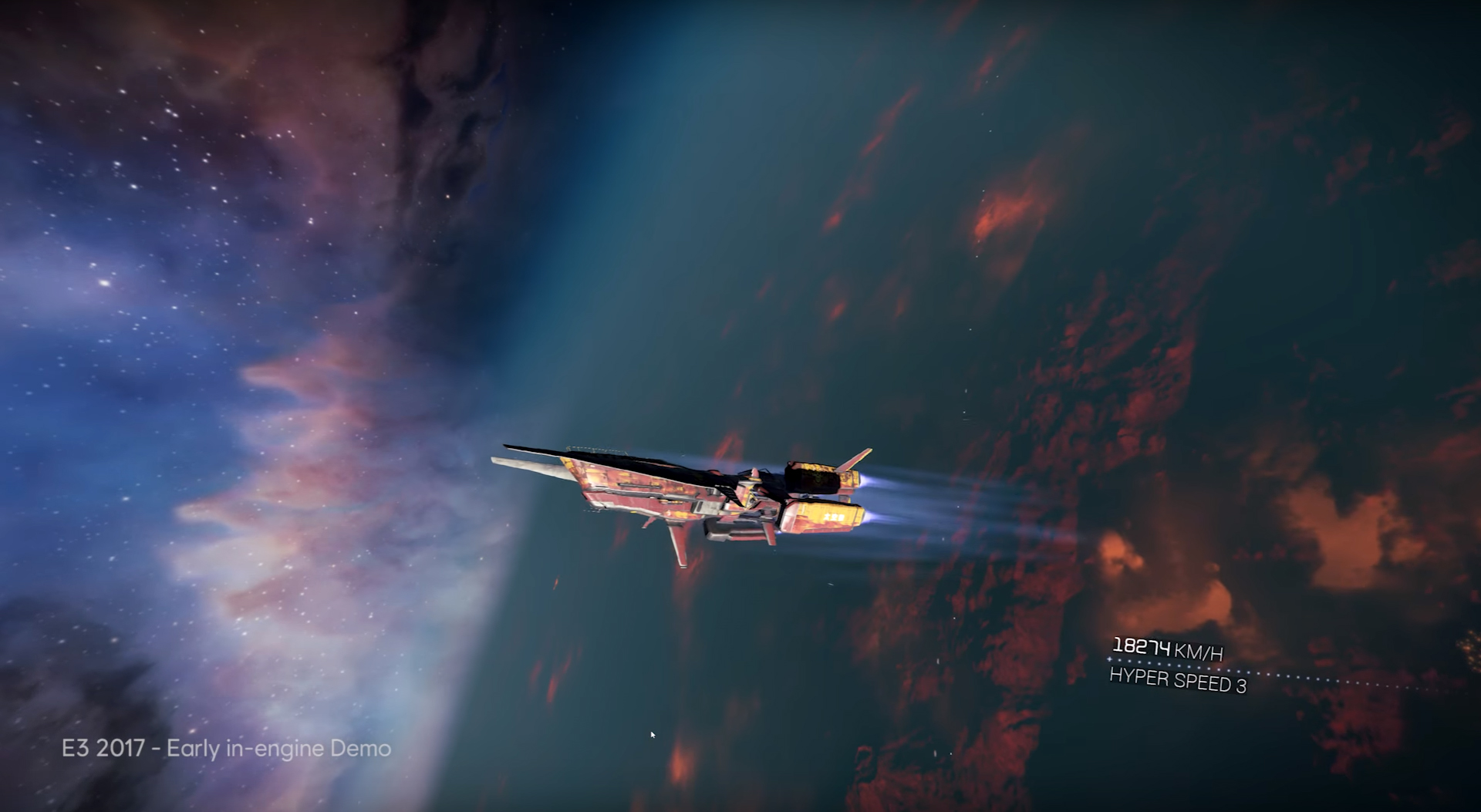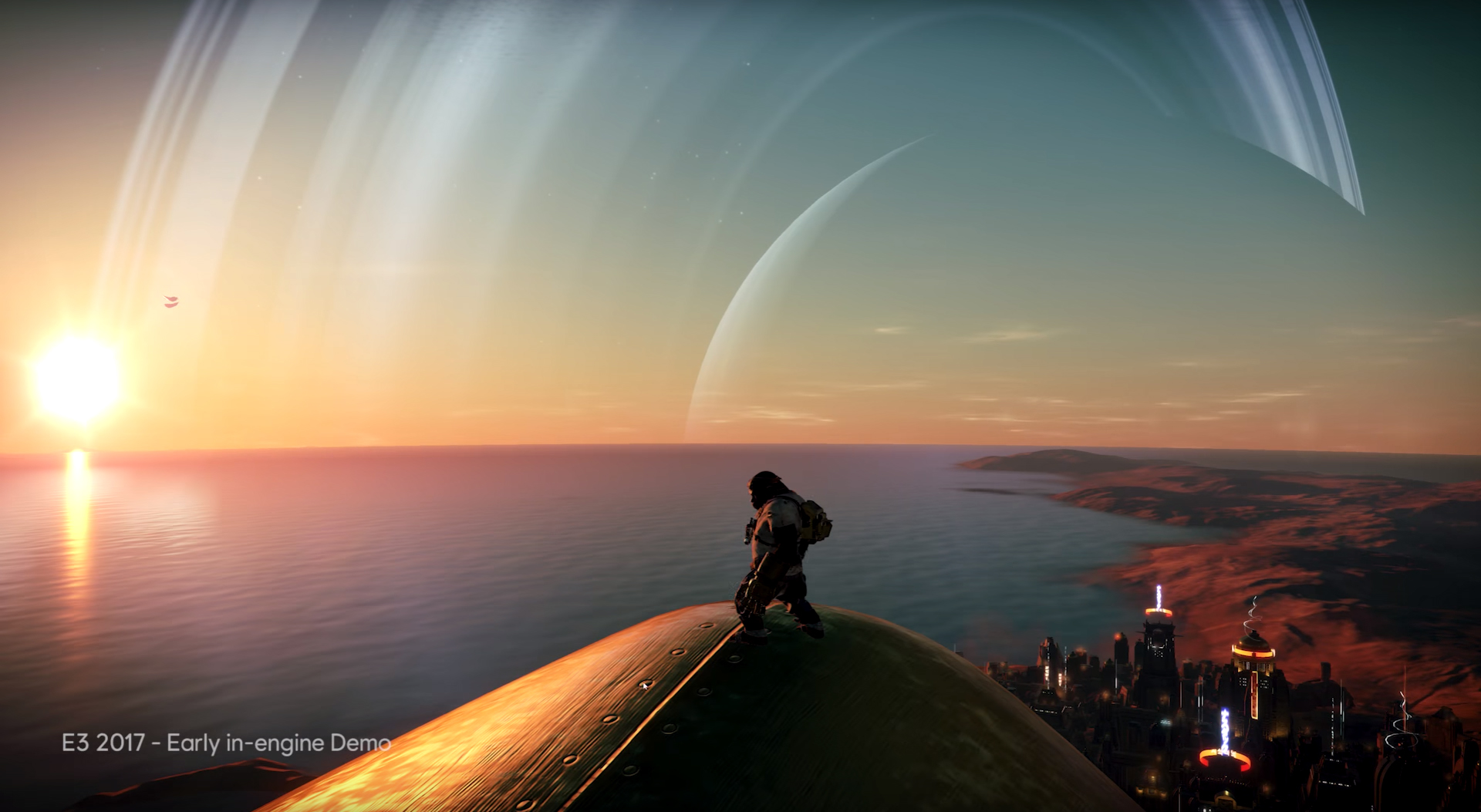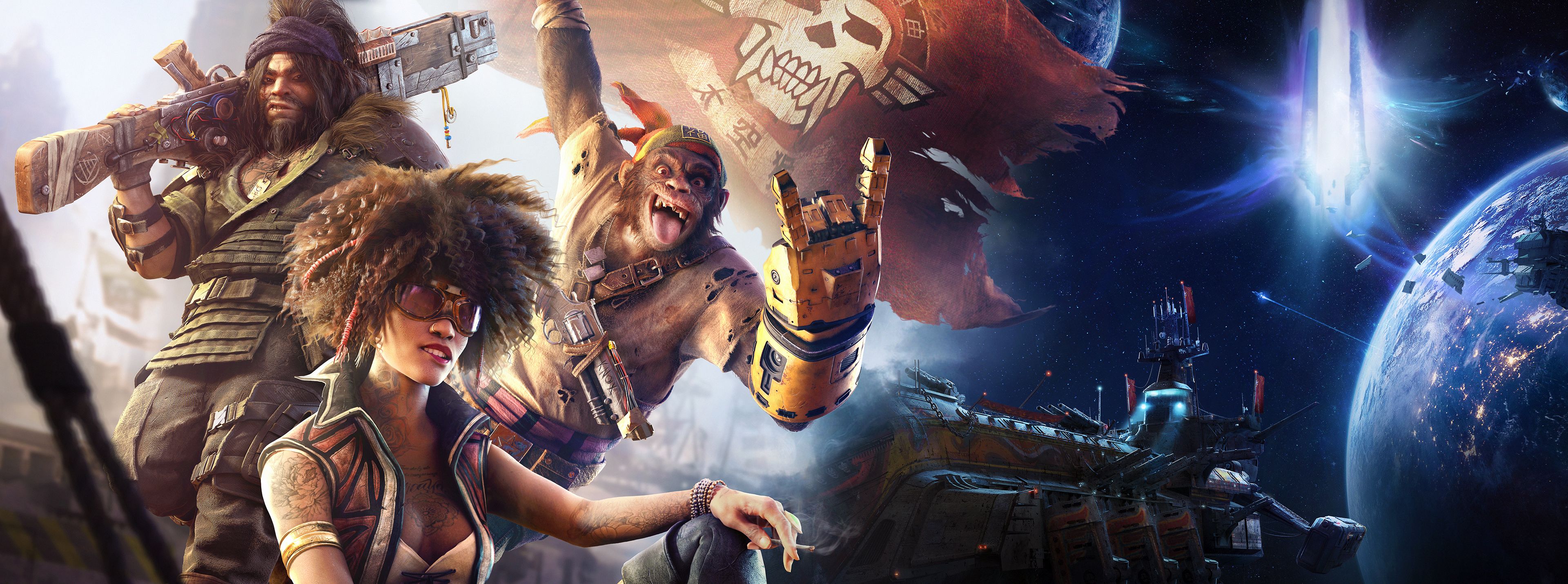Seeing a Beyond Good and Evil 2 trailer at E3 this year was exciting. I've been waiting for any nugget of info about the sequel for longer than I can keep track, and the cinematic showed off a beautiful sci-fi game that could potentially live up to everything I've been hoping for. But the further away from that initial reveal we've gotten, and the more we've actually learned about the game, the more my excitement has dripped away.
No gameplay was shown at E3, only a behind-closed-doors tech demo showing off some of what its engine can do. In an interview with creator Michel Ancel, he said he considered the game to be at "day one of development," which is not encouraging for a sequel that's already had its share of false starts. Worse though, that admission exposes that very little of what's been revealed about Beyond Good and Evil 2 so far has actually been executed. A lot of it is just ideas and promises right now—and they're promises we've heard before.
In-engine demo footage has now been publically released (embedded below), and seeing how little of an actual game Ubisoft has to show us really tipped me over the edge from being cautiously optimistic to just plain skeptical. The amount of times Ancel says they "want" something to work a certain way, before describing a feature straight out of No Man's Sky or Star Citizen is alarming. Those games aren't exactly the best company to be in when you're comparing promises—the former was an overhyped bore, and the latter is taking a long time, and a lot of public funding, to coalesce.
Add this to the fact that Beyond Good and Evil 2 has historically had trouble actually being made, and forgive me if the tech demo doesn't convince me with just "look how big this elephant is." Here are some of the specific things Beyond Good and Evil 2 has promised to be so far, and why they get me worried about a sequel I've been waiting a decade for.
You'll be able to seamlessly fly from planet to planet
Ancel has said a couple times that they wanted to make sure they got the game tech working before showing it off, and this seamless nature to the sequel's solar system appears to be the crux of what he's talking about. This is also the only promise on this list we've seen working as of now.
The only problem is that this isn't a new thing anymore. I don't mean to downplay the accomplishment, but No Man's Sky, Elite: Dangerous, Star Citizen, and indie MMO Dual Universe have shown off the same tech. What's become abundantly clear through all these cases is that the reason for leaving planets and what there is to do on them is far more important than the load screen (or lack thereof) between them. Which leads me to the next promise...

The worlds won't be empty, they will be full of things to do
Good god, how many times have we heard this one before? Every time a large-scale procedural game is pitched, we hear all about how the world will be alive and full of stuff to do. When No Man's Sky sold this idea, I and many other people were disappointed to find out that 'things to do' meant the planets were littered with the same stations and pods over and over again, hidden among different-looking plants and color palettes.
The biggest gaming news, reviews and hardware deals
Keep up to date with the most important stories and the best deals, as picked by the PC Gamer team.
A Ubisoft blog post last week was filled with quotes from Ancel that sounded hauntingly familiar: "When you see the sunset, it’s not just colors, it’s the real sun going into this position," he said of the sky viewed from a planet's surface. “Even us, we don’t know exactly what’s on this planet. We know there are things, but we don’t know exactly where they are, we don’t know exactly what it is,” he said of the procedural generation. These two claims are almost identical to statements from Hello Games before the release of No Man's Sky.
Mass Effect: Andromeda was originally going to work similarly, according to a Kotaku report, with more, larger, procedural planets. They had to scale back what was released, which was still disappointing to some. Beyond Good and Evil 2's focus on a smaller set of planets could help, but it didn't for Andromeda even when they got rid of the idea of mapping entire surfaces. I can't help but worry that we'll be flying to a couple handcrafted hubs on each planet, and then exploring nature to find a few procedural goodies on an otherwise uninteresting surface.

Random events and your interaction with them will have a real impact on the story
Ancel shows off a cool piece of tech that can deform planet surfaces with asteroid craters in real-time. The part that's not in the game yet is that evil NPCs will supposedly send slaves to go mine the resources in that crater, and you can take photos to expose that injustice to the public. Thus, planetary events and the story all come together in unscripted bliss.
Except these moments probably won't actually have much of an effect on the characters, because you can't really rely on random events that the player could skip altogether to advance a cohesive, linear narrative—unless you've built an unreasonable number of adaptable branching paths. It's another claim we've heard before, along the lines of 'choosing a side' in MMOs to help influence an overall war. Your impact in moments like this is so often overstated by developers that I just can't imagine it's anything but quest lines and garnish here either.
And while we're on this one, that point about meteors further suggests the previous promise is bogus. If the worlds are full of interesting things on the surface, but those surfaces can be deformed and destroyed by random events, how important actually are those things you can find? Surely there can't be anything too unique if a procedural space rock could come and blow it up.

And finally, it will be a Beyond Good and Evil game
Apart from the anthropomorphic animals, the sci-fi style, and Michel Ancel's brain running the whole thing, I worry this will feel like a brand new game set in the same creative universe. It's a prequel, it's set at a significantly different scale, and it's more adult and dark in its tone—see the frequent cursing in the cinematic trailer. Ancel's reference to taking photos hearkens back to the first game's photojournalism, but that's the only gameplay similarity we've heard about so far.
I don't think I'd ever compare Beyond Good and Evil to Grand Theft Auto, but that's exactly what Ancel has done for the prequel. So it's a different style of game, has a different cast of characters, is set in an age where the events of the first game haven't happened yet, has a different tone, and is focusing its marketing on procedural effects and exploring a massive, online solar system in huge spaceships... How is this a Beyond Good and Evil game, again?
All of this is not to say Ubisoft and Ancel can't do what they are saying they want to with Beyond Good and Evil 2—in fact, I wish them the best of luck because I would love to play the game they've described. But I don't think what's been shown and what's been promised are a very good indication of what's actually going to be delivered come launch—if it makes it there this time at all. We've been hyped up on a game with extremely high hopes for itself, but now Ubisoft actually has to make that game.


